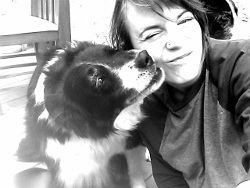
What Heart-Rifle Hybrids Have to Teach Us
Contributor’s Marginalia: Rosalie Moffett on “Winchester .351 High-Power Self-Loading Rifle” by Alexandra Teague
If our biological machinery were to become technical machinery, what other transformations would take place? What if, uncommonly, people were born with a congenital condition wherein their heart was some part rifle? What if love, that untenable abstraction, were honed to a measurable caliber, and that caliber was .351? What would we begin to understand about our longing, about what we’re looking for when we go out into the world, heart in hand?
I dig the way Alexandra Teague goes about these questions. The dream (“of a heart with all sights / attached”) seems, at first, a way for the poem to try on the clothes of transformation. But with that initial costume change, everything begins to tremble and slip identities. The cougar, normally the predator, becomes the prey in the scope of the Winchester. But prey is hunted, is overcome by the stronger, smarter, more powerful animal—that’s the romanticism of guns and gun catalogs, of sport. But here, the cougar is not chased—he comes and lingers. And the person presumed to be behind the gun—his tender skin, his silly thin-fingered hands, who wouldn’t stand a chance in the elements except for his handsome Winchester and his leather, fur-lined coat and hat—this is the predator.
When I got to the question “Who wouldn’t lose / this skin for an instant of lightning?” I felt the seduction of the technical, the beauty of that machinery that makes lightning, that shoots through steel, and felt it all the more because it is held up to the backdrop of the cliff, the wind, the animal. Does it matter which of them is waiting for transformation, which is lured by it, which is destroyed by it? Can we tell which is which? As the poem grows out of the narrow situation we first saw (someone hunting a cougar) that ‘who’ begins to encompass us as readers, to net us in the question “Who hasn’t gone / to a ledge like this and waited?”
Because of course, this isn’t cougars and guns, really. This is love, that old hunt, and we are netted in it, entrapped by it the way that the poem crept around behind us and pulled us in, led us to our own ledge. One of the most beautiful things about this as a love poem, to me, is the kind of attraction being examined here. It’s not the familiar draw of the speaker to an other. Instead, it’s the desire to believe we might have something inside us—“a heart with all sights / attached… / that can shoot through steel”—that, like a rifle, might protects us, give us the upper hand, even, when we go out in the in the world. A heart that evens out the relationship we have with the wilder, the stronger, more magnificent thing—the love we could let transform or destroy us.
The sonnet, an elegant work of mechanics in its own right, ends on a moment of gun-heart fusion that neither denies nor affirms our dream of safety: “the heart reloads even as it recoils.” Have we bagged something? Or are we reeling backwards on a narrow cliff? Is it the same thing? Perhaps it is.
 Rosalie Moffett was the winner of a 2012 “Discovery” / Boston Review prize. Her work has appeared or will in The Believer, Field, and Tin House among others. Originally from Eastern Washington, she is finishing her MFA at Purdue and will begin a Stegner Fellowship in the fall.
Rosalie Moffett was the winner of a 2012 “Discovery” / Boston Review prize. Her work has appeared or will in The Believer, Field, and Tin House among others. Originally from Eastern Washington, she is finishing her MFA at Purdue and will begin a Stegner Fellowship in the fall.